-
- USA/Canada 1-800-285-2726
- Australia (02) 8006 4411
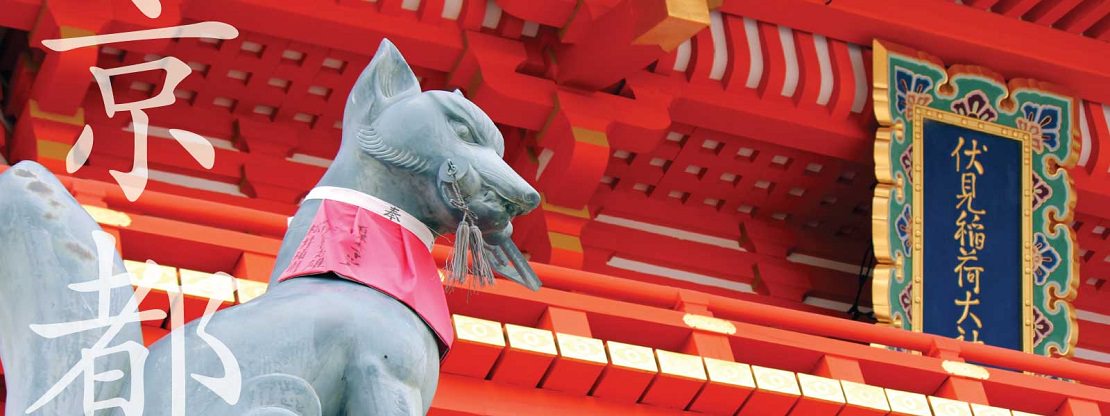
Region: Kinki/Kansai
Capital: Kyoto
Population (approx.): 2.543 million (2012)
Area: 1,781 sq miles
Area Rank: 31
Japan's former capital; Town with countless temples, shrines, and other historical structures
Kyoto's most famous geisha district; experience geiko and maiko entertainment
Tourist district reminiscent of old Kyoto; home of the famous bamboo groves
Famous for its beautiful bamboo grove of Kyoto
Sand bar considered one of the three most beautiful spots in Japan
Preciously restored neighborhood filled with traditional Kyoto-esque shops
Bridge reconstructed to model after the original bridge in Kyoto
Residence of Tokugawa Ieyasu, the first shogun of Edo
Famous for its snow monkeys in the winter time
Popular night spot to experience traditional Japanese arts
Boat rides down the river offer picturesque views of the canyons
Kyoto's Tallest Observation Tower
Kyoto Station offers illumination light shows that visitors can enjoy during the evening times.
One of a kind theme park, combining both movie sets and interactive attractions.
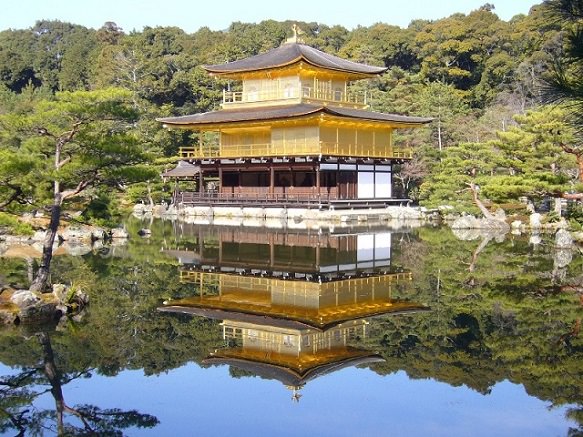
Kyoto Prefecture is located in the Kansai region and is best known as the former capital of Japan. Kyoto is one of the most visited areas of Japan and attracts many tourists from both within and outside of Japan. Although Kyoto was attacked many times during the war, the city was saved from attacks of the atomic bomb due to the historical significance of the city. Today the city has numerous temple and shrines that have stood for many, many centuries. Kinkaku-ji Temple, or the Golden Pavilion, is the most visited among the temples. The Zen temple, completely covered in gold leaf, brings all those who visit to awe. The Kiyomizudera is another popular, well visited temple in Kyoto. It is famous for its wooden stage 13 meters above the ground that offers a beautiful view of the city from a distance. During the spring and fall, cherry blossoms and maple trees bloom beautifully adding a beautiful backdrop. If you’re looking for another impressive sight in Kyoto, be sure to visit the Fushimi Inari Shrine. The thousands of vibrant orange-red gates are picture perfect. Fushimi Inari Shrine has been gaining increasing popularity through the years. If you’re in Kyoto during July, be sure not to miss the Gion Matsuri, one of the three major festivals in Japan. The beautifully decorated, enormous floats are carried through town, bringing excitement to the town.
Iconic temple covered in pure gold leaf
Stunning arrangement of thousands of red torii gates
Panoramic view of Kyoto from the broad wooden veranda
Zen Temple with Meditating Rock Garden
Famous shrine dedicated to Emperor Kammu, the fonder of Kyoto, and the Emperor Komei, the last emperor in Kyoto
Famous for its 1001 statues of Kannon, the Goddess of mercy
Buddhist temple known as Kode-dera or Moss Temple
Retreat Villa Turned Temple
Temple's Dava gate leads you to the main hall of the temple
Head temple of the Buddhist sect Seizan branch; beautiful autumn spot
Outstanding temple featuring a small bamboo grove and landscape garden
Head Rinzai Zen Sect Temple Built Over Friendship
Zen temple known for its golden Kannon statue
Only Buddhist Temple from Heian-kyo
Hidden Temples in Arashiyama which has about 1,200 Jizo statues
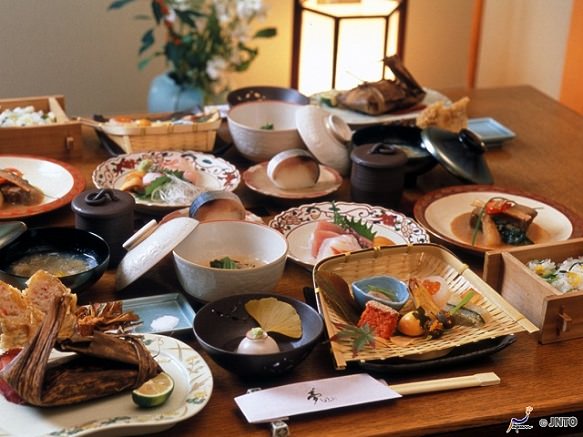
Kyoto has many local dishes but is perhaps known more for its styles of meals. “Kaiseki ryori”, traditional Japanese multi course meals, are especially popular in Kyoto due to the area’s refined nature. Kaiseki ryori consists of multiple small dishes starting with several appetizers, leading to a main dish, and several side dishes as well. Sashimi, tempura, rice, fish, and pickled vegetables are a part of many kaiseki ryori. “Shojin ryori”, or vegetarian dishes, are another style of meals popular in Kyoto. Many Buddhist monks were against taking life from other living creatures, opting for vegetarian options. A popular shojin ryori dish is “yudofu”, hot pot consisting of tofu and vegetables.
Sake manufacturing company
Yatsuhashi is a popular souvenir and confectionery from Kyoto, Japan
Narrow shopping street filled with shops with Kyoto specialties
Over a century of fine sake making using traditional sake-brewing methods
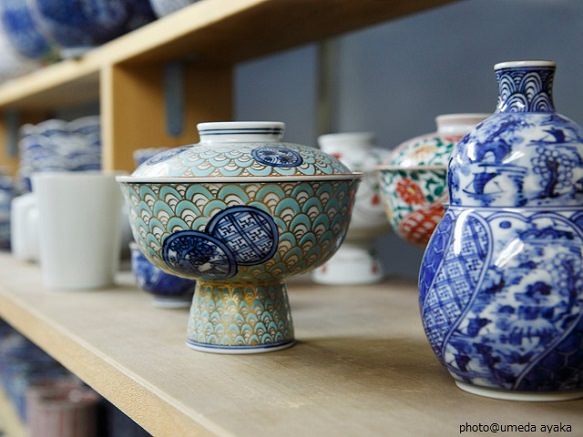
Kiyomizu yaki is a type of pottery that originated in Kyoto in the 5th century. Its name comes from the famous Kiyomizu Temple, where the pottery was first created. Kiyomizu yaki features beautiful colors and elegant designs but do not have one specific defining factor. The pottery features various kinds of techniques and styles, appealing to a large audience.
Shibori is the method of dyeing cloths.
Museum dedicated to preserving Kyoto's traditional and cultural works of art
Japan and Kyoto's Finest Craft Collections including Kimono & Yukata
Kimono Show and Demonstrations.
Kireji is a type of cloth used for mounting scrolls.
Great Collection of Obi and Fabric
Japanese Indigo dyeing and the Pure Vegetable Dyeing
Traditional Japanese Clothing with a Modern Twist
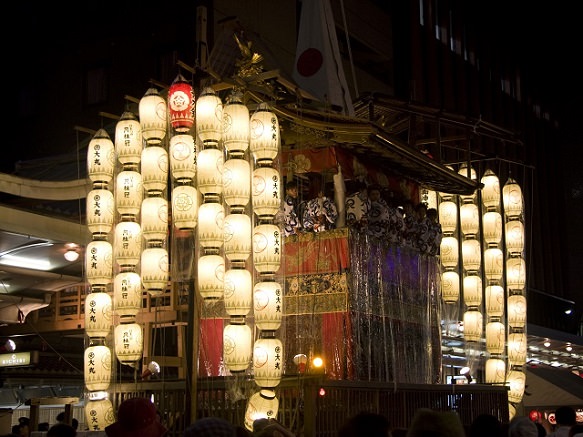
Kyoto features the largest festival in Japan, the Gion Festival. The festival takes place during the entire month of July and features two parades, held on July 17th and 24th. The parade held on July 17th is called the Yamaboko Junko and is the larger of the two. Yamaboko Junko features two kinds of floats: yama and hoko. Yama are smaller floats carried by people on their shoulders and hoko are larger floats on wheels, pushed by people. Gion festival is especially famous for the hoko, which weigh up to 12 tons. These enormous floats maneuver through town, making each sharp turn by the collective efforts of the men chanting as spectators join in on the chant.
Jidai Matsuri is another large festival in Kyoto. Jidai Matsuri occurs every October 22nd and is a large reenactment of historical events of Japan. The reenactments feature authentic costumes appropriate for each time period, covering various events such as the Emperor's relocation from Kyoto to Tokyo, the country's unification by Emperor Komei, and more. Portable shrines called mikoshi are brought out to start the event and allow people to pay their respects to Emperor Komei and Emperor Kanmu. The procession lasts about five hours and features approximately 2,000 people dressed in authentic costumes representing various figures such as samurai. Jidai Matsuri is a great festival that features historical events with authenticity.
Most famous festival in Japan; festival of Yasaka Shrine
Have a beautiful Japanese Kimono on you and stroll the old town.